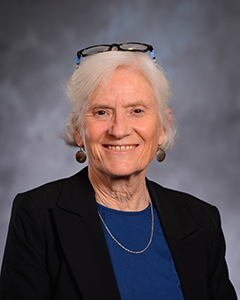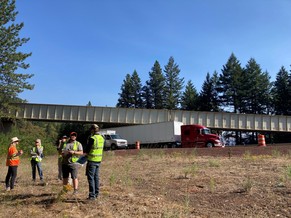Dear Friends and Neighbors,
This Tuesday, February 1, our Oregon Legislature will be back in the Capitol as we convene in Salem for the start of the 2022 legislative session. It won’t be a long stay, however, since the second year in a two-year biennium is referred to as our ‘short session,’ bound by a constitutional limit to last for no more than 35 calendar days.
I’ve outlined my priorities for this year in the information below. During a short session, each legislator can introduce two ‘personal bills.’ Mine will focus on wildfire recovery and broadband connectivity. In addition, as Chair of the House Committee On Environment and Natural Resources, I oversee committee work and shepherd environmental proposals though the legislative process. I’m excited about an array of important concepts, including bills to fund wildlife crossings and to protect vulnerable Oregonians from the kind of heat events we experienced last summer.
I’ll also continue as a member of these committees:
- My Personal Bills
- Environment & Natural Resources Committee
- Attend & Testify Remotely in 2022 – and beyond!
- Rent Assistance Available Once AgainIt Has Arrived!
- ARPA Funding for District 5
- Contact Rep. Pam Marsh
In addition to policy legislation, I expect to see significant budget investments in critical areas, including behavioral health care, workforce development, childcare, housing, and—good news for parents!—summer programming for children.
Clearly, it’s going to be a jam-packed few weeks. Although the short session was originally intended to be limited to budget fixes or limited course corrections, in our increasingly complex world we can’t wait to act on emergent issues, such as wildfire and pandemic response. However, no question that it will be challenging to get the work on my list checked off with so little time.
If you have questions or would like more information about any of this work, please reach out to my office. As always, heartfelt thanks for your support, your feedback, and your partnership on the issues we care about.
Best,
State Representative
Oregon House District 5 – Southern Jackson County

My Personal Bills
Wildfire Impacted School Districts Funding – HB 4026
On September 8, 2020, the Almeda wildfire ripped through the communities of Talent, Phoenix, and unincorporated Jackson County. The fire destroyed the homes of 700 children, from 500 families, who attended school in the Phoenix-Talent School District.
Our community is resilient, and we are pursuing rebuilding with great vigor and all available resources. But recovery is a long process, and it will be years before our displaced families have permanent housing back in the community. In the meantime, the school district is making herculean efforts to reach out and stay in touch with families, including operating buses that go far beyond their normal routes. Because school funding is predicated on attendance, the district stands to lose millions of dollars in revenue during this critical period of rebuilding. The story is similar in three other districts, including the McKenzie, Lincoln County and Santiam Canyon school districts. A significant funding cut at this time would be disastrous for districts and the communities they serve.
I drafted House Bill 4026 to provide stable funding for qualifying districts through the 2024-25 school year. District funding for each year will be calculated based on 2019-20 attendance numbers—before the fires. Funding needed to make up the difference between the amount distributed to the districts in 2019-20 and the funding that otherwise would be calculated based on post-fire attendance will be provided through a transfer of $25 million from the statewide Education Initiatives Account to a new School Stabilization Subaccount for Wildfire Impacted School Districts.
This revenue is essential for school districts that are doing everything possible to support children and families who are still struggling with displacement and trauma. The presence of a strong, robust school district is also a critical to the community’s economic vitality and its ability to recover and to attract new residents and businesses.
Connecting Oregon for the 21st Century – HB 4092
My second bill is devoted to broadband. With an infusion of federal dollars on the horizon, I have drafted HB 4092 to ensure that the Oregon Broadband Office (OBO) is prepared for a major rollout of broadband infrastructure. Oregon is poised to receive more than $200 million to invest to build services from the American Rescue Plan Act (ARPA), and the Infrastructure Investments and Jobs Act (IIJA).
For more information about our bill, click HERE.
This is a once-in-a-generation opportunity. With federal dollars, we can invest in affordable internet service for rural and marginalized communities across the state. But we have to be ready. HB 4092 addresses oversight of the Oregon Broadband Office, sets up a grant review process, and suggests a strategic planning framework to ensure that we are investing in a resilient, accessible and sustainable broadband network.
Additional priorities during this session:
In addition to these bills, my priorities for the session include continuing work on strategies and funding to combat the illegal hemp and cannabis industry (SB 1564; HB 4016) and to support workers who have been exploited on these sites (HB 4074).
I am also advocating for additional funding for homeless services and facilities. Last year’s Project Turnkey enabled local communities across the state to purchase 19 motels for use as shelter or transitional housing. I’d like to see a second round of that funding.
And, I am working to secure funding for Briscoe School rehabilitation project. Built in 1948, the school is now owned by the City of Ashland and currently serves 266 children through Oregon Child Development Coalition. A state investment would cover repairs and upgrades, including and floor replacement, asbestos abatement and a new HVAC system.
Environment & Natural Resources Committee
Emergency Heat Relief for Communities – HB 4058
Historically, summers in Oregon have been relatively cool. Few of us have felt like we needed air conditioners. But conditions are changing. Last year at least 96 Oregonians in 28 communities across the state died during the record-breaking heat wave. Most people who died had no access to life-saving cooling devices such as air conditioning or heat pumps in their homes, and many were renters with low incomes. The most vulnerable people were seniors, people with disabilities, or people with underlying medical conditions, especially those living in upper-level multifamily units or manufactured homes.
HB 4058 allocates $5 million to Oregon Health Authority for emergency air conditioner deployment to residents most at risk in heat events. For longer term relief, the bill will provide $10 million to Oregon Department of Energy for efficient heat pump incentives. Funding will allow local community organizations to provide bulk purchase and installation programs prioritized to low-income and environmental justice communities, especially rural residents who utilize bulk fuels like wood, oil, and propane or the electric resistance heating that is found in many manufactured homes.
A companion bill in the Senate, SB 1536, aims to provide emergency heat relief specifically for renters with several proposed actions, including removing barriers for renters to install portable air conditioners, requiring cooling in rentals that are new construction or recently renovated, and funding incentives for landlords to provide cooling.
Wildlife Crossings Investment Act – HB 4130
Many wild animals—mountain lions, bears, Pacific fishers, elk, deer and others—are killed by vehicles in Oregon every year. Drivers are also endangered. In 2019, ODOT recorded over 6,100 wildlife-vehicle collisions (WVC), resulting in damage to vehicles and roads, injury and fatalities to motorists, and significant damage to our wildlife. This is likely an undercount, as researchers estimate that the actual number of WVC in Oregon is at least two times the number reported. A recent auto insurance analysis found that Oregon has the highest likelihood of wildlife crashes among west coast states. In 2020, the cumulative cost of WVC with two species—mule deer and elk—totaled $56.9 million in Oregon, which includes vehicle damage, medical expenses, and lost hunting values.
Fortunately, this issue is getting national attention, and for the first time ever, Congress has dedicated funding for wildlife crossings—$350 million will be available over the next five years through the federal infrastructure bill. Wildlife crossings, which allow wildlife to cross over and under roads, are effective and proven solutions, they can pay for themselves over a relatively short term, and they are widely supported by the public and diverse interest groups.
Oregon can be competitive for these federal dollars by allocating state funding that can be invested immediately and leveraged for federal grants, many of which have matching requirements. HB 4130-1 proposes an investment of $7 million dollars in targeted projects that will reduce WVC to make our roads safer for people and wildlife.
Private Forest Accords – Overhauling Forest Management Practices in Oregon
In 2020, environmental groups and the timber industry reached an impasse when both sides introduced competing ballot measures. Environmental groups proposed strict limits on spraying aerial pesticides and increased protection of forest waterways, while the timber stakeholders wanted compensation for private landowners when logging is hindered by state regulations. In February of 2020, Governor Brown brokered an agreement between numerous conservation and fishing groups and timber and forest products entities to abandon a costly and divisive ballot initiative fight in exchange for proactive legislation supporting collaboratively developed changes to forest practices.
Some changes were implemented immediately, including modifications to the state’s aerial spraying regulations. The parties also agreed to discuss proposed changes to forest practices. After ten months of work, the groups reached an agreement that creates a path to revise management of more than 10 million acres of private forestland. The agreement enhances safeguards for fish and wildlife while protecting logging as a viable industry.
Specifically, the parties agreed on a framework for:
- Riparian buffers for streams, rivers, and bodies of water
- Steep slopes protection to minimize erosion and protect habitat
- An approach moving forward to improve forest roads; and
- A path forward to make adjustments and adaptation to forest practices in the future
SB 1501 will implement the agreement. If approved, the state will then pursue an HCP with a rulemaking process directed by the Oregon Board of Forestry.
Attend & Testify Remotely in 2022 – and beyond!
As we head into yet another session overshadowed by COVID-19, the legislative committees will continue to hold virtual public hearings. And, thanks to HB 2560, which passed in last year’s session, remote options will be available for your engagement—not just in 2022, but indefinitely! This new law requires government agencies, whenever possible, to allow the public to remotely attend public meetings and to testify via telephone, video or other electronic means. This enormous improvement towards Oregonians’ ability to engage in civic processes is a silver lining in the pandemic cloud.
It’s easy to participate:
- How to Testify in Committee Hearings
- Shortcut to Watching Committee Hearings
- Citizen Engagement FAQ Page
- Quick Access to 2022 Legislative Session Information
Rent Assistance Available Once Again
On January 26, the Oregon Housing & Community Services (OHCS) began again accepting new applications for the Oregon Emergency Rental Assistance Program (OERAP).
This will be a limited reopening of at least three weeks, based on availability of funds. The agency estimates there are enough funds to support 6,700-9,300 additional renters, who will be prioritized based on those who have the most need, not on a first-come, first-served basis. OHCS was forced to pause the intake of applications on December 1 because the agency did not have sufficient federal funds to serve additional renters.
To serve the most households, applications are being offered for first-time assistance only, and the program will not be offering utility assistance. Tenants seeking utility assistance may access additional Low Income Home Energy Assistance Program (LIHEAP) resources at the local level from community action agencies (in our area, that is ACCESS). Renters who submit new applications can access protections from eviction for nonpayment of rent while their application is being reviewed and processed. OHCS will begin processing these new applications and paying out funds in about three to five weeks. Applications for tenants who applied before the OERAP application pause on Dec. 1, 2021, will be processed before applications received on or after Jan. 26, 2022, as directed by the Oregon Legislature.
Important information for tenants:
- Tenants can apply for OERAP at oregonrentalassistance.org or contact a local community action agency. Applying for OERAP is now easier because the application has been streamlined and simplified based on feedback.
- Tenants can use this simple Tenant Checklist (link) to gather their documents in advance.
- OHCS has identified sections in non-English applications where the translation from English is not complete, and is working with the vendor to correct this issue. All applications are fully functional and can be submitted, but applicants may see phrases that are not fully translated. Paper applications in languages other than English are fully translated and can be found here.
- Applications received on or after Jan. 26, 2022, will be paid after prioritization criteria has been applied based on remaining funding available and are not guaranteed.
- This will be a limited reopening of at least three weeks, based on availability of funds.
- Tenants who submit new applications can access protections from eviction for nonpayment of rent while their application is being reviewed and processed. Tenants must show proof to their landlord that they applied for the program to receive the protections.
- OHCS will begin processing and paying out new applications in about three to five weeks.
Tenants at immediate risk of eviction should apply for rental assistance right away to access safe harbor protections and also contact a legal organization:
- Oregon Law Center’s Eviction Defense Project: 888-585-9638 or [email protected]
- Oregon State Bar: 503-684-3763 or [email protected]
It Has Arrived! ARPA Funding for District 5
I am so pleased to share that, after a 7 month wait, the American Rescue Plan Act (ARPA) funding has arrived for three projects in House District 5. ARPA is a $1.9 trillion economic stimulus package for communities across the US approved by Congress last Spring. Under the Act, $4.2 billion was granted to Oregon. The Oregon Legislature opted to directly distribute $240 million to each of the legislative districts. Each member of the Oregon House of Representatives was allocated $2 million, and each Senator $4 million, for one-time expenditures within their districts.
The three projects I applied for include:
Talent Maker City Permanent Location – $1.8 million
 |
This money will be used to design and build a permanent facility for Talent Maker City, a 501(c)(3) nonprofit working to build a more connected and prosperous community through hands-on creativity and STEAM-based education. Areas of service include workforce development for unemployed adults, equitable and inclusive programming for underserved youth, and building community through creativity and cultural exchange. Funding will cover a new 8500 sq. ft facility, including the purchase of land, architectural planning, permitting, systems development charges (SDCs), construction and furnishings/equipment.
The TMC permanent location will be used to:
- Provide a creative and welcoming community gathering space in downtown Talent.
- Expand workforce development programming, particularly in construction-related fields to address housing needs.
- Increase early career technical education opportunities and promoting high-wage, high-demand jobs for underserved youth.
- Support start-up creative businesses and entrepreneur.
- Offer intergenerational learning opportunities.
- Support Southern Oregon’s maker ecosystem and the next generation of thinkers, innovators, and problem-solvers who will tackle tomorrow’s issues of sustainability. Swiftly respond to community disasters and trauma, such as COVID-related PPE shortages and fire relief/aid.
- Support diversity, equity, and inclusion in programming and access.
- Serve as a creative and cultural hub for Southern Oregon.
- Continue to provide STEAM camps and educational programs to local Talent-Phoenix youth, many of whom were severely impacted by the Almeda fire
Applegate Valley Internet Accessibility – $100,000

Through a series of community listening sessions with residents, businesses, and community-based organizations, A Greater Applegate—the Applegate Valley’s community development organization— determined that adequate internet is one of the community’s most important missing resources. Funding will provide technical assistance, including a project coordinator, internet subsidies and discounts for internet and coordination and administrative services.
More specifically, the internet accessibility project will:
- Conduct research to identify and map internet access
- Identify local challenges with providers, geography, etc.
- Build a local coalition of stakeholders concerned with affordable and accessible internet to serve in advisory and advocacy capacity
- Develop relationships with telecommunications providers in the region
- Strengthen relationships with government officials and community leaders to raise awareness about needs.
- Explore and pursue community-owned internet, using other communities as models
- Make recommendations and pursue internet solutions for the Applegate
- Provide subsidies for services and equipment to residents who cannot afford basic internet
Greensprings Fire Protection Equipment – $100,000

Greensprings Rural Fire District (GRFD) protects 166 square miles of dense mixed conifer forests, open grasslands, high-desert plateaus and oak chaparral, and serves numerous unincorporated rural residential communities, including the Greensprings, Pinehurst, Lincoln, Hyatt Pines, Howard Prairie and the Fall Creek Ranch. GRFD currently relies on two antiquated and worn-out fire apparatus that were built in the 70s and 80s.
This capital funding will be used towards the purchase of a new fire protections engine(s).

